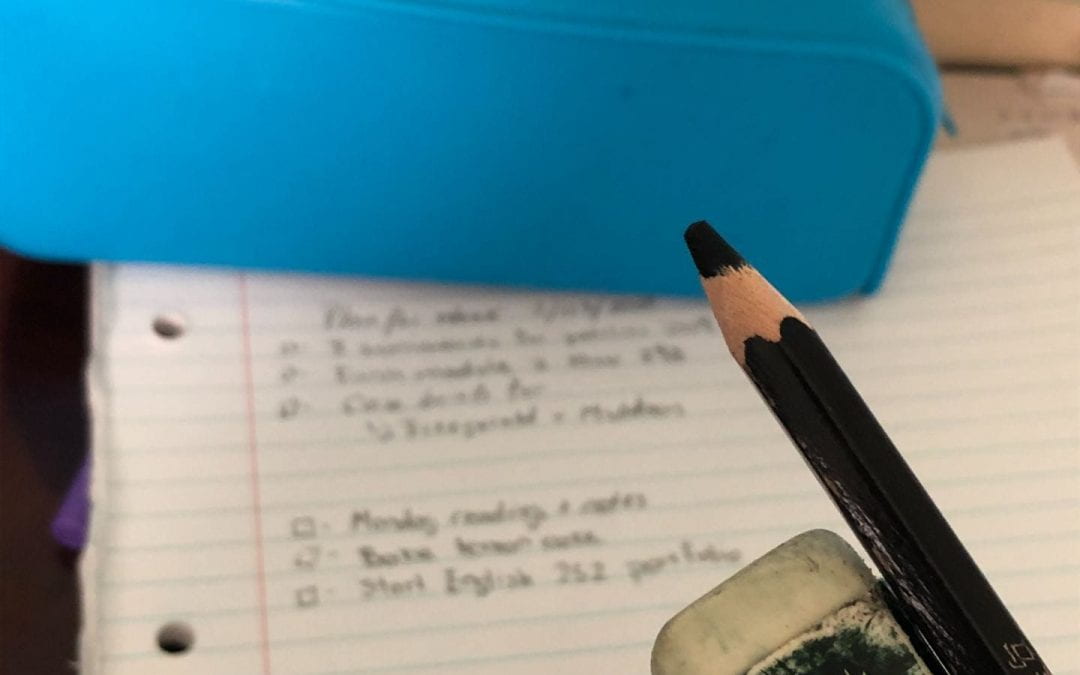It’s interesting coming back to university as a second-year student. This time last year, I was overwhelmed with my introductory courses. ‘I will succeed in this course,’ I thought, and was making mental lists of all the things I had to do to get the most out of them. Coming to university with just a high school education, I often felt daunted by what seemed to be expected of me and often beat myself up over not meeting my daily to-do list.
This year, introductory lectures went very differently. While I thought about how to title this post, I don’t want to tell you how to be flexible or why it’s important – I want to tell you that I think I’ve learned a lot from my approach to study, university, living alone, and ultimately working my way through a 5-year degree that will hopefully put me on the path to being the kind of person I want to be.
Sometimes it may seem like the only way to really succeed is to get every single thing done on time. This is a lot to ask of yourself. While weekly readings and review (which might involve typing up PowerPoints and then summarizing lecture notes) is very helpful, it also pays to ask if you really need to put your mental health aside just to get things ticked off your to-do list. If you’re tired, stop. Chances are you won’t be absorbing the content in the same way. This goes especially with online uni. Looking at a screen for a long period of time tires your eyes and sitting still for too long can just as easily leave you feeling tired and worn out. Last night I didn’t finish everything I planned to, and that was perfectly fine. Just make sure you plan ahead and maybe start readings and PowerPoints early. Study smart, not hard. Being flexible and adjusting to take care of yourself is just as important.
I also really recommend writing things down as they come to you instead of just making mental to-do lists. If you’re anything like me, you’ll remember all the different things you need to do at random times, while you’re doing something else (sending an email or paying your accommodation, remembering what time a quiz opens or remembering what time a class starts, when assignments are due, etc). Making a mental note is just an extra responsibility that doesn’t have to be that way. Paper is your friend! Keep a notepad around and write these things down and just cross them off when you’re done. It helps a lot to have something else keeping track of your responsibilities, and you won’t be scouring your mind for things you may have forgotten.
I worked at a rest home over the summer and one of the most repeated anecdotes I heard from people in their late nineties was, “take things as they come.” I’ve started to apply that this year and you have no idea how just two days into the semester, it has helped. It’s not that long-term thinking is bad – it’s that putting too much emphasis on things way into the future isn’t so good for your present self. Think ahead but don’t stress before it’s time. Courses are designed to build on your skills and knowledge day by day, week by week. Have a look at past exam questions to get a general idea of what the course focuses on, but don’t let your self esteem or mental health ride on things that are out of your control.
Remember that university is about the formation of PEOPLE. We want to be turned into skilled people with good work ethics and strong values, who contribute to society and leave the world in a better state than the one we found it in. Take care of yourself first and foremost.
I guess my suggestion is to make a study plan but not be too rigid with it. Plan your degree, but keep in mind the world won’t end if one class is closed or you can’t get into the stream you want. Keep up with your readings but go to bed if you’re tired. See people and go outside when you feel like you need it. Go with the flow and take care of yourself. Keep an open mind and listen when you talk to others. If you feel like you haven’t connected with people yet, don’t worry. They’ll come, I can guarantee it. There are so many valuable people here for the same reasons as you, it just might not be obvious at first. First year is hard and scary and you never know what to expect, but trust me, it gets easier the more comfortable you get with the tools to tackle new challenges.
If it makes you feel any better, I’ve already discovered new sides to people I thought already knew. I’ve been able to adapt to this third lockdown. And I feel much more at peace with myself as I plan how I’ll make the most of this semester. I’m only starting year 2 but I was talking to a 3rd year medical student who told me she feels like a different person at the end of each year (in a good way). If you’re flexible, you’ll be able to enjoy your studies and the freedom of having control over your time and being able to learn what you love. This is a huge opportunity – if you can go with the flow, the ride will be much more enjoyable.
